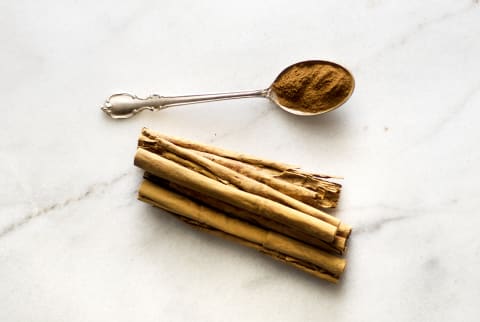The One Mistake To Avoid When Buying Cinnamon


Whether you sprinkle a bit in coffee or add a tablespoon to your baked goods, cinnamon is beloved by many.
Growing scientific evidence suggests there are many health benefits of cinnamon: It may help with blood sugar control1, exert antimicrobial effects2, curb inflammation3, protect against cardiovascular disease4, boost cognition5, fight tumor growth6, and even regulate the female hormonal cycle7. Although larger, randomized controlled trials remain to be conducted, the plethora of in vitro and small-scale human studies are provocative and promising.
But before you begin adding cinnamon to everything in sight in order to reap the aforementioned health benefits, let's pause. It turns out that the type of cinnamon you're using matters, and there's a specific kind that's safe to eat in large amounts.
Wait—there are different kinds of cinnamon?
Most people are totally unaware that there are actually two main kinds of cinnamon.
First, there's the more widely available cinnamon that you can find at your local grocery store, called Cassia. Cassia cinnamon sticks are tough, made up of a single layer of bark, and the flavor is strong, spicy, and pungent—it's that spice we most often encounter during the holidays in fragrant cookies, cakes, and eggnog. If the variety of cinnamon isn't specified on the label, you can safely assume it's Cassia cinnamon.
The second type of cinnamon is Ceylon or "true" cinnamon, as it's a variety that originated from the island country neighboring India known as Ceylon, or Sri Lanka. It now grows in other parts of the world and is sometimes referred to as Cinnamon Verum. Compared to Cassia cinnamon, the bark of true cinnamon is multilayered and breaks easily, with a more delicate, light, and citrusy flavor.
So why does the type of cinnamon matter?
It turns out that Cassia cinnamon contains measurable amounts of a natural compound called coumarin, which acts as a blood thinner and prevents blood clotting, but at high enough doses, coumarin has been linked to liver toxicity8.
On the other hand, "true" or Ceylon cinnamon only has trace amounts of coumarin9. While an occasional sprinkling on your French toast or in your coffee won't really matter, it may be worthwhile going out of your way to find some Ceylon cinnamon, especially if you're planning on piling on the spice.
So there you have it—enjoy cinnamon in abundance for its gorgeous flavor and potential health benefits, but choose "true" cinnamon to best protect your liver and overall health.
A final note: Don't be afraid to use regular cinnamon on occasion! The stronger, spicier notes of Cassia cinnamon are sometimes perfect for the flavor profile of certain recipes. As always, balance is key, and reading your labels is always a good idea.

Kanchan Koya, Ph.D. is an author and an expert in harnessing the power of spices for health and well-being. She received her bachelor's degree in molecular biology from the University of Texas at Austin and her doctorate in biomedical sciences from Harvard University. She is passionate about demystifying spices and other natural ingredients that can help support optimal health, and writes about functional food and the magic of spices at her website Spice Spice Baby. Her self-published book by the same name includes recipes for the whole family including baby purées, remedies, an other unexpected ways to use spices in the home.
9 Sources
- https://www.ncbi.nlm.nih.gov/pubmed/24019277
- https://www.ncbi.nlm.nih.gov/pubmed/26109781
- https://www.ncbi.nlm.nih.gov/pubmed/25629927
- https://www.ncbi.nlm.nih.gov/pubmed/23867208
- https://www.ncbi.nlm.nih.gov/pubmed/24559058
- https://www.ncbi.nlm.nih.gov/pubmed/20653974
- https://www.ncbi.nlm.nih.gov/pubmed/24813595
- https://www.ncbi.nlm.nih.gov/pmc/articles/PMC3385612/
- https://www.ncbi.nlm.nih.gov/pubmed/24148965